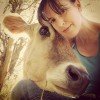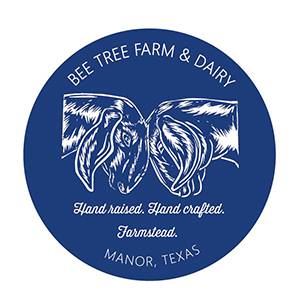
Tough Love
At 6p.m. on an August evening in Texas, it is hot. But worse than that, it is still. Hot and still, and my body is so heavy with exhaustion that every movement feels like running under water. Crouched over a goat whose body may have given up, showing symptoms I frantically try to diagnose from the feeble list that’s tattooed into the Goat Care quadrant of my brain while an army of fire ants attacks my ankles – marches in a line up my leg. Jeremy has just come home from work, and I see the distant motion of his body pacing the porch while holding a baby who wails for reasons we will never understand. His cries confuse my herd of mama goats. They call back frantically while looking around in alarm to identify the source of the screaming. Whose baby is crying?
Eventually I make a decision about the goat, a buck – Boss – one of my original four and one who has no value beyond the tattered sentiment I cling to. He represents many of the naïve decisions I made in the beginning. But he is here, he is my responsibility, and I love him. So my course of treatment represents the harder decisions I have to make now. I start my vaguely educated, scatter-shot approach towards treatment, rely on goat mentors, lessons already learned, internet research. For him, I do not call a vet. It’s part of the evolution of animal care here, and it’s a tough transition.
Two weeks after the babies were born we also made the hard decision not to call the vet to care for Winnie, my beloved Jersey cow. Her condition, a steady decline that we could not resolve, was due to old age. After finding her unable to stand for the third time in just a few months, understanding that her condition would continue to deteriorate and watching her struggle – we knew it was finally time to say goodbye. I buried my head in her neck and whispered thank you’s through tears, and then went inside to rock the babies while she was put down, gratefully at home in her own pasture. That decision was also part of our evolution of care.
And last week I heard a goat scream as I fed Cora on the porch. The bleating came from the barn in the female goat pasture, but the herd had walked into the large pasture that spans the front of our porch. There shouldn’t have been any goats left in that area. I walked/jogged towards the barn, the bottle I’d been using for my baby fell to the ground. Cora screamed in frustration. In that moment I saw that Birdie, one whose charms have nearly earned her a spot as an indoor goat, was trapped beneath the hay feeder. In the midst of breeding season, as caprine hormones boil, it appeared Birdie was the victim of goat-on-goat crime and had been head butted into a dangerous position. Had I not fed Cora on the porch that night, I may not have heard Birdie cry. And now that I’d found her, Cora was wailing. I looked at the goat, looked down at the baby, crouched to the ground and retrieved the bottle that had slipped from my grasp – raced inside. Cora’s hunger turned vicious, and she screeched out her anger as I laid her down in the crib, shouting to Jeremy that I was going to extricate a goat. “You’re going…..?” his question was silenced by the door that slammed behind me as I sprinted to the barn, fumbled with the gate latch, fell to my knees and starting pulling Birdie free from the metal feeder where her limbs were tangled. After a few tense moments in which I wondered if emergency welders were available at night to extricate stuck goats, I got her free. She took two wobbly steps towards me on sore legs, then pressed her forehead into my cheek and let out a faint, grateful bleat.
I chose the goat over the baby. That decision is part of our evolution of care here, too.
In response to Birdie’s story, my friend Kimberly – who has raised three children on her own farm – wrote that motherhood on a farm is a constant juggling act between the human and the farm babies, making decisions you’re either happy about or beat yourself up over for years to come. Yes, the kids become a part of that juggling act but, she said: “Good news is it seems to make them stronger. Love them with all your heart and show them what it means to love something else, as well.” The evolution, transition, the shift of priorities here would have happened despite the babies – as we develop the business and need to make more financially responsible decisions that still focus on humane treatment of the animals. But put into action, it ends up feeling like tough love. I do the best I can within reason. Sometimes this means I put the animal first, sometimes the child, and right now – holed up in a dark corner of my house for a moment to re-capture some sanity as a baby cries for no reason in the other room – I put myself first.
The reality of two newborns, a budding business, and a living, breathing piece of earth is that even the best laid plans must sometimes be laid to rest. If only for a little while. It means I learn all I can about veterinary care and livestock health in order to not spend the entire budget on a veterinarian’s visit. It means the kids will watch (and help) as I administer medicine on steaming August nights. They’ll swat at ants on their legs, they’ll consider the options. They’ll hug necks. And say goodbye. I want them to watch as these dramas unfold, participate in the decisions, and see how – at times – I ask them to wait along the sidelines while I attend to the many creatures that are, actually, a part of the family. It’s not a flippant justification, it’s how we keep the entire operation running – a jagged pill to swallow for folks with only indoor pets. It’s because I love every single thing here so deeply that I have to get tough with how my affections, attention, and dollars are dispensed. I don’t linger over these decisions like I used to. That sort of sadness is a luxury we can no longer afford. I hug my babies – be they human or livestock – and hope the latest wounds will leave a scar, a callous, a thicker skin to get me through the next hard decision that is surely, always, coming.
Categories:
Barnyard, Cows, Dairy, Goats, Motivation






7 Comments
Ashley
August 30, 201510:28 pm
Amen sister. That is all.
Carla
August 26, 20152:46 pm
Anyone that would question your choices has not had to raise livestock. Sentiment must never turn to neglect when it comes to our animal charges. It’s the right thing to do—always. As for human babies, I’m quite certain that a baby has never died from crying. Trapped goats on the other hand…..
Hang in there. Cooler temperatures will be upon us and the grass will green up with winter rains.
Crystal
August 25, 20158:52 pm
Yeah. It’s tough and it feels insane sometimes. I can’t imagine doing it with two infants. I don’t know if it actually gets easier. I think this post sums up why I turned away from my roots, yet reminisce deeply and mourn for my fur and feathered friends of my childhood. Maybe I’ll get back to it someday.
On another note, my friends thought I was insane when I suggested a pirate eye patch or a nickel bullet solution instead of taking a dog to a canine optomologist. Who knew those even existed!?
Erica
August 25, 20157:17 pm
Your writing is really wonderful. Thanks for sharing.
Laura – CaledonAcres
August 25, 20152:19 pm
WOW! Such an inspiration!! I love the farm life and I have experienced NOTHING compared to you – we currently have about 50-60 chickens and 3 dogs and 2 cats… But even with this much (or little), I’ve sometimes thrown my hands up in the air and “had enough”…until the next day :) I love the post!!
Mary Ann
August 25, 201512:36 pm
Losing an animal was the hardest thing to get used to… kudos to you for keeping sane!
Davi
August 25, 201512:13 pm
Oh my goodness. I know exactly how you feel. A couple weeks a go we had to put our dairy goat down. She was down in the morning when I went out to milk, bloated. I treated her bloat and she should have been getting better, but she wasn’t. I made that oh so hard decision not to call the vet, knowing it would cost way more than what the goat was worth, aside from our emotional attachment to the ornery alpine. When she started to have seizures my husband put her down. It is so hard to make that decision. I know the vet probably couldn’t have helped her and we would have lost our doe and had a large bill to pay. More than what another goat would cost. A lot of people don’t understand that. They think we are horrible people for not calling the vet. Farm life can be so hard, and if we aren’t careful, we will go broke and not be able to live this crazy tragic, almost magic life. Keep up the good work!